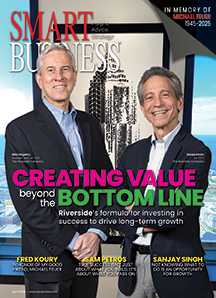Create an open environment
For the most part, Waggoner’s focus is external and strategic. He deals with investors, customers, suppliers and other forces that affect Echo’s position in the marketplace.
But what happens inside, happens on employees’ turf.
“Whether it’s a dress policy or processes and procedures internally, the best things bubble up from within,” he says. “I may be part of the approval process. I may have power of veto. But I don’t see it as my job to sit around and design how the company operates.
“You get the power of ‘two heads are better than one’ times a thousand, and the best decisions come from that. My role is to create an environment where smart people can come up with good solutions and get out of the way.”
The key to creating that is providing pathways for ideas to come out as well as a culture that encourages openness.
“Everybody wants to be heard,” Waggoner says. “People that are deep into a process and doing it every day have a much different feel for it than somebody sketching it out on a whiteboard. … You’ve got to create an avenue for those ideas to bubble up to where they can take action.”
Echo’s avenues include the basics, like a suggestion inbox where employees can e-mail ideas. Waggoner personally responds to each one. If the issue doesn’t fall into an area of his involvement, he’ll forward it to the appropriate person and ask that he or she follow up.
He also created an independent committee — separate from management — as Echo Connect. The group is sort of like a mediator between the front line and the boardroom.
“I gave them basically three guidelines,” Waggoner says. “I said, ‘Whatever you do, it has to be good for employees, shareholders and customers. You can’t be overbalanced in the direction of employees, and yet, you guys are an employee advocate committee. Your job is to hear what the employees have to say, bring it to the executive group and also be willing to take the feedback from the executive group to the employees in a way that it’s credible because it’s coming from their peers.’”
Waggoner selected a chair for the group, then stepped aside. He didn’t care who other members were as long as they knew they had access to him to vet ideas.
While Echo Connect is one means of getting suggestions from employees to management, people don’t have to be on the committee — or jump through any hoops at all — to score a meeting with the CEO.
“I grew up in a world of hierarchy, and my new goal in life is to not have hierarchy,” Waggoner says. “You’ll always have some amount of hierarchy, so you’ve got to be willing to ignore it a little bit — which means walking around talking to people, having them feel free to walk in your office.
“People shouldn’t feel like they have to absolutely follow the chain of command. If somebody wants to come tell Doug Waggoner a great idea that they have, they should know that they can do that without any fear of retribution or political disfavor.”
To make employees comfortable with approaching him directly, Waggoner reaches out to smaller groups by hosting monthly lunches with five to 20 employees.
“I use half of the meeting to give them an update on the company, and then I use half the meeting to essentially interview them,” he says. “It’s a very nonthreatening environment; they’ve always got me outnumbered. I just simply drill down on some area and I ask, ‘What’s going on in the marketplace? How could we attack it better?’”
Even then, some employees will feel intimidated broaching ideas with you. Many will open up in their functional teams, but Waggoner uses anonymity as a catchall.
“Some people are prone to speak up and some are not, so you have to try to draw things out of people,” he says. “When there’s anonymity, people will say what they think. So we do periodic employee surveys to take a pulse of everything from, ‘How’s our culture working?’ to ‘How can we serve our customers better?’”
Regardless of what avenues you set up, the way you respond to ideas will determine how open the environment is.
“You can’t shoot people for taking a position or speaking their mind or even being critical,” Waggoner says. “If people recognize that you’re not going to overreact to things based on emotions and opinions, then they bring things forward.”

